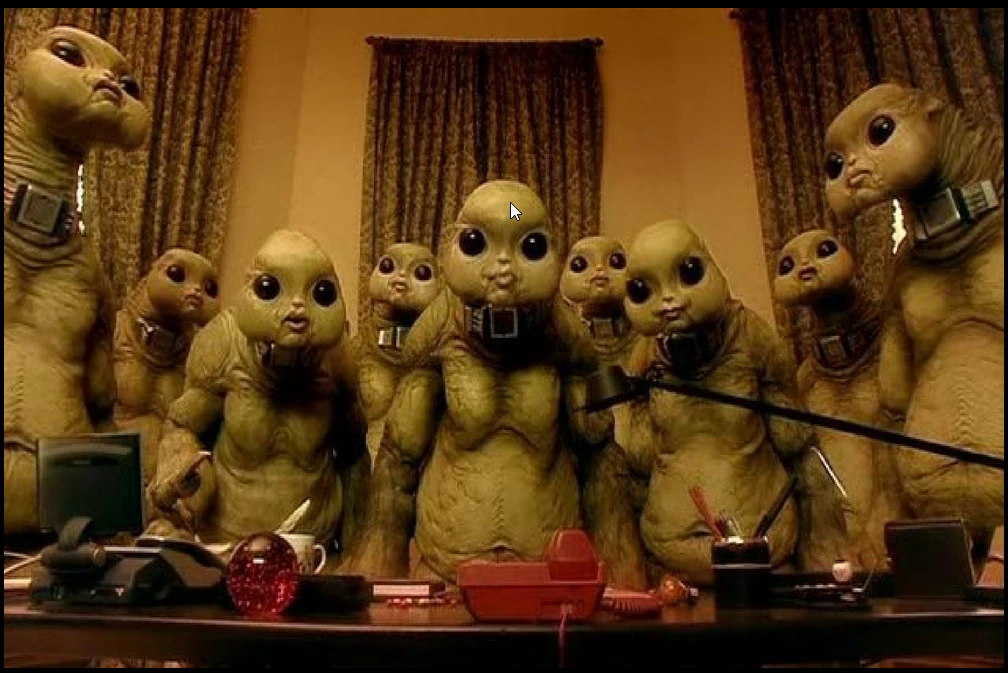Peter Capaldi and Jenna Coleman are well and truly up to speed again in Doctor Who Series 9, and with the sheer fun and portentous finale of Episode 5: The Girl Who Died, they’ve only added to the brilliance of the series. This time around they find themselves in the company of Maisie Williams off of Game Of Thrones, playing a valiant Viking girl, and she makes a welcome addition to the storyline, causing more than a few ripples in the space-time continuum before the episode is done.
“The Girl Who Died” is a deeply peculiar episode in this most eccentric of seasons. On the surface it recalls last year’s divisive “Robot Of Sherwood” – a daft historical “romp” (oh how loaded that word has become forWho fans) with little regard for historical accuracy. On the other, it’s clearly meant as a major turning point in the life of the Twelfth Doctor.
Before all that, however, we’re treated to a gently funny adventure with shades of Monty Python and Horrible Histories. The Vikings here are a broadly-sketched lot – Maisie Williams’ Ashildr aside – but it doesn’t matter. This is no more a serious Norse saga than Who‘s original comedy historical, “The Romans”, was an accurate portrait of life in the Empire. Crucially, it is genuinely funny and packed with sharp lines and neat ideas.
Way back in “Deep Breath,” Doctor Who made us a promise about this new incarnation: This was the Doctor with the veil lifted, with the disguises removed. Last season went to some lengths to sketch out just what that might mean, kicking around ideas of whether the Doctor was really a good man and presenting a more remote version of the Time Lord. Some of it worked, some of it didn’t, but the whole thing had a slightly didactic quality, as though the show were straining to construct an argument about the nature of the Doctor it never quite managed to work out. “Death In Heaven” largely resolved this as the Doctor proudly asserted his identity, and the episodes since have hit upon a much simpler, more pleasing way of presenting a Doctor without artifice. With the Doctor of “The Girl Who Died,” there’s almost nothing beneath the surface, and what you see is pretty much what you get. The Doctor isn’t playing the happy wanderer or the whimsical madman as a way to deflect attention from his true feelings, but he also hasn’t swung all the way back to wondering what emotions are in the first place.
 The Doctor and Clara start the episode in a whole lot of trouble, throwing us right into the action before the credits have even run, which is always a good sign. When the Doctor gets his act together just in the nick of time to save his TARDIS companion, who’d been stranded in outer space with a killer spider crawling around in her space suit, they teleport back in time and land themselves in even more bother at the hands of a Viking village and their God overlord, Odin. Starting an episode at the end of an untold adventure always makes for a good intro to a story as it feels like they go out of the frying pan and into the fire week after week, which is sort of what it feels like throughout the majority of the many generations of Doctor Who. Just when they think they’re out of the woods they manage to find another darkly forested situation to get embroiled in and this time around it’s a band of marauding Vikings, their merciless godling impostor and a brave Viking girl that are in the thick of it with them.
The Doctor and Clara start the episode in a whole lot of trouble, throwing us right into the action before the credits have even run, which is always a good sign. When the Doctor gets his act together just in the nick of time to save his TARDIS companion, who’d been stranded in outer space with a killer spider crawling around in her space suit, they teleport back in time and land themselves in even more bother at the hands of a Viking village and their God overlord, Odin. Starting an episode at the end of an untold adventure always makes for a good intro to a story as it feels like they go out of the frying pan and into the fire week after week, which is sort of what it feels like throughout the majority of the many generations of Doctor Who. Just when they think they’re out of the woods they manage to find another darkly forested situation to get embroiled in and this time around it’s a band of marauding Vikings, their merciless godling impostor and a brave Viking girl that are in the thick of it with them.
“That’s not the real Odin.” “Of course not, he doesn’t even have a yoyo.”
The opening destruction of the sonic sunglasses sets the tone, as the Doctor immediately accepts that, yeah, he and Clara are going with the Vikings. The scene with Odin and the yoyo is brilliantly played by Peter Capaldi, as he finds room for deeper emotions and more impressive moments—when he first sees Maisie Williams’ Ashildr, when he tells Clara that he got out of his handcuffs by magic—amid all the bickering with his companion about his lack of plan and his deeply unconvincing Odin impression. The Doctor’s voice as Odin a wonderful choice, as it’s the kind of half-assed imitation that someone would only undertake if he really, really thought the locals were dumb enough to believe anything. But then, he was going to bluff his way out with a yoyo, so that really goes without saying. Although one might at least have figured the Doctor was, you know,good with a yoyo, an assumption of which the episode most hilariously disabuses us.
There’s a good amount of comedy to the episode, ranging from the hilarious vision of Ofin’s face in the sky and some great quips from the doctor to the dim-witted comic style of Tom Stourton who plays a Viking blacksmith whom the Doctor names Lofty. It makes it a fun and light-weight adventure for the most part, but just when you think it’s all just a jaunty jape in the past it suddenly gets a wee bitty serious on you, giving it much more gravitas and series impact than you’d bargained for. Once “The Girl Who Died” establishes that dilemma for the Doctor, of how to defeat the false Odin without putting humanity at greater risk, it answers the question in two distinct ways, one speaking to the head and the other to the heart. The first is in seeing how the Doctor does eventually work out a plan that will deliver victory for the Vikings. His strategy is pleasing on multiple levels, as it effectively takes the silliness on display in so much of the episode and weaponizes it against the more serious threat of the Mire. The solution lies not in making the Norse more fearsome but rather in getting the aliens to admit they are every bit as ridiculous as anything else going on here, with the Doctor showing off some clever psychology about the importance of reputations to boot. The preceding sequence, in which the Doctor realizes the electric eels are the solution as the townspeople gawp at him, is one of the best-realized examples of the Doctor appearing only dimly aware that there is anyone else in the room with him. Again, “The Girl Who Died” is very smart in when it makes the Doctor alien and comedic and when it makes him human and emotionally vulnerable.
Make no mistake: The Doctor of this episode is as alien as ever, but “The Girl Who Died” allows him to feel and then articulate recognizable emotions. When he feels rage and heartbreak after Ashildir’s death, he doesn’t hold back in his reactions or—and this is crucial, given how circumspect the Doctor can be—explaining just why he feels so strongly. In pretty much all phases of the episode, the Doctor is honest in ways we so rarely see him be. When Clara points out that he never actually tells her the rules of what they can and can’t do, he gradually admits that there really aren’t any hard-and-fast laws, just lots of unintended consequences. This isn’t an episode where the Doctor pretends to not have a plan right up to the opportune moment. He genuinely has no idea how he, Clara, and a bunch of Norse farmers and fishermen are going to defeat one of the galaxy’s most fearsome warrior races, and that melancholy hopelessness informs both his joy when he does come up with a plan and his heartbreak when he realizes he once again couldn’t save everyone.
More grating was the return of the Doctor’s ability to speak baby. It’s deployed here to more serious effect, but that doesn’t really work… The gravitas of the Doctor asking “do babies die with honour” is hard to swallow when it’s been spurred on by him translated an infant’s gurgling. The Doctor has been getting pretty serious for a while now, in particular with his concern for Clara’s well being and it’s beginning to feel a bit too much like a warning than well meaning care.The Girl Who Died only adds to this sense of rising foreboding and the more serious, mortality-framed ending acts as a significant reminder of Clara’s relative frailty, despite her evident action adventure skills. The fact that we also know that Jenna Coleman will be calling it a day on Doctor Who some time during Series 9 only adds to the tension every time she finds herself in a pickle.
Where the episode really works, however, is in the scenes between the Doctor and Ashildr (Maisie Williams). Capaldi’s performance has been funnier and more obviously “Doctory” this season, but it’s also been increasingly clear that his is a selfish hero. As his testing of the theory that ambiguously led to O’Donnell’s death in “Before The Flood” showed, this Doctor is concerned primarily with protecting the lives of the people he knows. “I lost someone who matters to me,” he says at one point here, and he later predicts Clara’s potential demise and it’s all about how he will feel when it happens.
But then he meets Ashildr, and there’s a connection and her death shakes him to his core. It sparks the memory of saving Caecilius at Pompeii and reminds him that he can do pretty much anything he likes. There will be consequences (more on that next week…) but it gives him a purpose again. “I’m the Doctor, and I save people” feels like a moment of real triumph and realisation. Shame that it was plastered all over the trailers. I haven’t yet talked much about the episode’s big guest star, as Game Of Thrones favorite Maisie Williams plays the title character, an individual who is quite rudelynot Susan or the Rani or River or Jenny or a Clara fragment or whoever else. Rather, she’s just a brave, kindhearted girl that neither the Doctor nor the town could bear to lose. Williams is very good here, although I suspect it’s next week’s “The Woman Who Lived” that will really see her show off her acting chops and challenge the Doctor, so I’ll save most of my discussion of her work for that next week. Her best quality here is one that likely won’t surprise those familiar with Arya Stark, as she has a presence here that feels both authentically medieval and eminently relatable. When she undoes Clara’s very smart work talking the Mire into leaving and declares war on them, she reveals herself the product of a culture nearly as alien to us as the Mire, yet it also feels completely logical for her to defend her town’s honor in this way. Much as this season’s episodes have seen Peter Capaldi move from playing the Doctor to, at least to the extent it’s possible, being the Doctor, so too does Maisie Williams show the difference between pretending to be a Viking girl and really inhabiting the role.
“She might meet someone she can’t bear to lose. That happens. I’m told.”
When Peter Capaldi said, pre-series launch, that “the Doctor is about to make a mistake that has cataclysmic repercussions,” most of us assumed he was talking about leaving the young Davros to die (or not). But on the evidence of this week, not a bit of it. Three stories in, we’ve had the blockbuster one, we’ve had the creepy, old-fashioned one, and now it seems, we’ve reached the fulcrum of the series. In saving Ashildr (Maisie Williams) just a week after calling out the Fisher King for bending the rules of life and death, the Doctor has done exactly the same, and he realises straight away that he’s on dodgy ground. Davros’s warnings about “the hybrid”, and that “compassion is wrong” are surely going to hang heavy over the coming weeks, that final lingering shot of Ashildr darkening as she watches everything around her die, trapped in her own, endless life, is surely going to have consequences.



